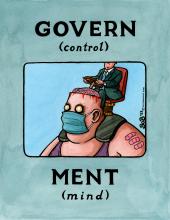2024-01-22
Two articles (at least!) of interest here:
UK Column:
Off Guardian:
Interrogating “Multipolarity”: A Response to “Understanding Power Dynamics”
Both are rather long and written by very knowledgeable people, and the second is a response to the first.
They both deal with the future nature of the relationships between nations under the oversight of a reformed United Nations, and in the context of the now rather infamous Public-Private Partnerships between said nations, the UN, and the corporate world,
The primary players:
- The global network of corporations (Google, Microsoft, et al) and the corporate controlling interests (Black Rock, State Street, Vanguard)
- Charitable foundations of international standing (Bill and Melinda Gates, Clinton, Rockefeller, Open Society, Oxfam, Red Cross etc), the WEF and and other assorted NGOs too numerous to mention
- The network of Central Banks, World Banks, BIS, IMF etc which control the world's money flows
- The world's militaries (NATO, Russia, China et al)
- The world's legal institutions (International Court of Justice, International Criminal Court, European Court of Human Rights, European Court of Justice, and all the national supreme courts around the globe, most if not all of which operate under the law of commerce / the law of the sea
- The institutions of global governance (UN as umbrella organisation)
- The world's information collection and dissemination systems (currently largely owned by media moguls of a specific tendency) and education systems. Without rigorous honesty integrity and freedom to undertake and publish the fearless investigative journalism that has been so suppressed and lacking in recent years, other reforms will of themselves be inadequate.
All of which form an interlocking control grid that must eventually be viewed and reformed as a whole if it is to become a viable platform upon which to build a successful future of peaceful cooperation around the world.
What all this boils down to is the age-old questions:
- What do we need government for?
- What should government not do?
- How should governance best be established?
What is "governance" anyway?
What does an organisation do that cannot be done by a self-organising collection of motivated individuals?
Whether we are discussing the local parish council or the United Nations, the principles involved should be the same. It is not going to work without integrity at all levels, so complete and prompt transparency is a prerequisite.
I hope somebody somewhere is taking this wider view into account ...



